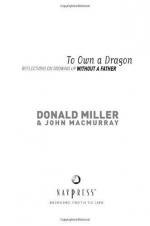
|
| Name: _________________________ | Period: ___________________ |
This test consists of 15 multiple choice questions and 5 short answer questions.
Multiple Choice Questions
1. Where is Miller offered a home when living in Boring, Oregon?
(a) In a house shared with an elderly person.
(b) In a garage apartment at the MacMurrays.
(c) In an apartment with friends.
(d) In a trailer with coworkers.
2. Miller's mother attempts to find father figures for her son by involving him in which community organization?
(a) Cub Scouts.
(b) Little League.
(c) Boy Scouts.
(d) After school program.
3. What is the responsibility of the adult male elephant in a young elephant's life?
(a) To teach the young elephant how to bathe himself.
(b) To teach the young elephant how to select a mate.
(c) To show the young elephant what it means to be a male elephant.
(d) To teach the young elephant to hunt and feed a family.
4. What activity does Miller not enjoy until he begins college?
(a) Studying.
(b) Math.
(c) Gym.
(d) Reading.
5. Miller's stories in Chapter 1 seem to highlight what emotions from his childhood?
(a) Happiness and joy.
(b) Loneliness and singleness.
(c) Anger and frustration.
(d) Friendship and loyalty.
6. According to the author, what percentage of male prisoners grew up without a father?
(a) 85%.
(b) 25%.
(c) 75%.
(d) 95%.
7. Where are Miller and John MacMurray when Miller first begins to understand the relationship between God and fathers?
(a) At work.
(b) On a trip up a mountain.
(c) At home.
(d) In church.
8. Miller's uses many words to describe his meeting with MacMurray. Which of the following is not a work he used to describe his meeting with MacMurray?
(a) Serendipity.
(b) Destiny.
(c) Fate.
(d) Divine intervention.
9. As a child, which animal does Miller most want to own?
(a) Unicorn.
(b) Horse.
(c) Dragon.
(d) Bird.
10. Who gives Miller the key to his new home?
(a) Terri MacMurray.
(b) John MacMurray.
(c) Elle MacMurray.
(d) Cassie MacMurray.
11. What does Miller describe God's love for humans as?
(a) Imperfect parents.
(b) A perfect father.
(c) Good parents.
(d) A imperfect father.
12. What does Miller state that the dragon reminds him of?
(a) A giant protector.
(b) Power.
(c) Freedom.
(d) A real father figure.
13. Miller found the characteristics of a strong male authority figure in whom?
(a) David Gentiles.
(b) John MacMurray, his mentor.
(c) His boss.
(d) Politicians.
14. As a child, what type of clubs does Miller think men participated in?
(a) Clubs that shared secret information about women and cars.
(b) Card clubs.
(c) Country clubs.
(d) Clubs that only let certain people in.
15. What is the reason that Miller gives for failing to find positive male influences in his life?
(a) He does not give a reasonn.
(b) There were none around.
(c) His immaturity.
(d) His insecurity.
Short Answer Questions
1. Why does Miller not trust the motivations of male authority?
2. As a child and adolescent, who does Miller resent?
3. Is Miller's concern with the social problem of all boys who grow up without fathers?
4. Miller suggests that submission to God's will allows God to do what for humans?
5. Miller describes his mother as being exhausted because of him. He learns the real reason she is exhausted. What is this?
|
This section contains 577 words (approx. 2 pages at 300 words per page) |

|




